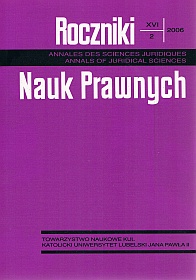The Right to Privacy Versus the Sacrament of Penance in the Code of Canonical Law of 1983
Abstract
The right to privacy in Church stems directly from dignity that each human being is entitled to. Hence the subject of the right to privacy protection in Church is every person. Privacy is one of spiritual goods; therefore it should be protected by any authorities, including the Church authorities. The inclusion of the natural right to respect of one's privacy into the positive law of the Church provides a legal guarantee of this right. The entitlement, specified in can. 220, protects the most private sphere of human being, “the core” of human personhood, thus granting each person a right to protect their privacy in the Church. On the other hand, the canon furnishes norms that oblige us not to infringe on other person's privacy. Due to the unique spiritual mission that the Church has to fulfil in the world, it penetrates human being's privacy on various planes. The chief sphere is the Sacrament of Penance and Reconciliation, in which the Church legislator protects human privacy thanks to the sacramental secret of Confession. This sphere is extremely sensitive as the law stipulates punitive measures for not keeping the secret of Confession. The Code guarantees personal privacy protection also in terms of non-sacramental spiritual guidance.
Copyright (c) 2006 Roczniki Nauk Prawnych

This work is licensed under a Creative Commons Attribution-NonCommercial-NoDerivatives 4.0 International License.


